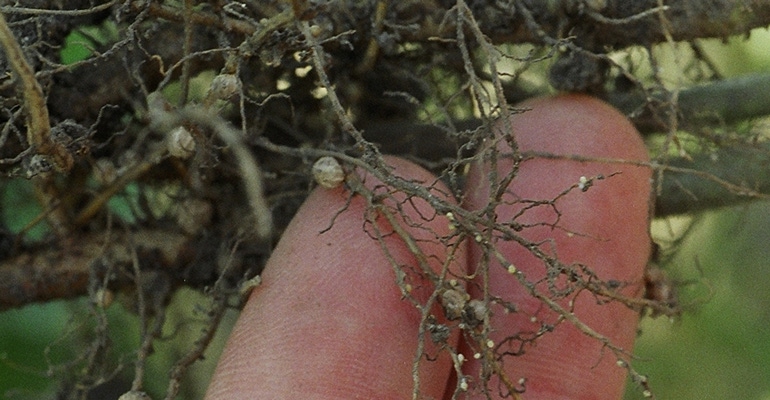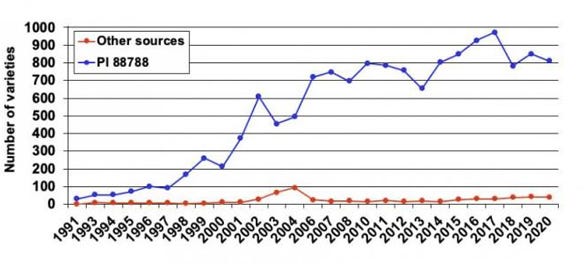November 25, 2020

Soybean cyst nematode is one of the most damaging pests of soybeans in Iowa. Fortunately, there are soybean varieties bred to be resistant to SCN, and farmers can help manage SCN by growing an SCN-resistant soybean variety. These varieties tend to yield well as a result of keeping the SCN feeding and reproduction in check.
Each year Iowa State University gathers information about SCN-resistant soybean varieties available in Iowa and has an Extension publication to inform farmers of their choices. In addition to variety name and brand, the publication provides details about each variety, such as relative maturity, herbicide resistance and iron chlorosis tolerance.
The genetic source of SCN resistance also is listed for each variety. Common sources of resistance are the breeding lines PI 88788 and Peking, and there are a few varieties with other sources of resistance. Compilation of the variety list is funded by the Iowa Soybean Association, and the publication also is supported by ISU’s Integrated Pest Management Program. This year’s list is available online here.
A range of SCN resistant soybean varieties is listed in the publication. There are lots of choices:
Of the 849 named varieties, 222 are in maturity group (MG) 0 to 1, 337 are in MG 2 and 290 in MG 3.
The varieties are from 22 brands. The brands include varieties developed by companies and public varieties developed by ISU.
Among all brands, 786 of the SCN resistant varieties also have resistance to certain herbicides.
There are 63 varieties with no herbicide resistance from seven brands and ISU.
There isn’t much diversity in the SCN resistance genetics. Almost all the varieties (810, or 95%) have SCN resistance from PI 88788. There are 35 varieties with the Peking source of resistance from 14 brands. New this year, the Golden Harvest and Northrup King brands each have a variety with resistance from breeding line PI 89772. These are the first two varieties with this resistance trait sold in Iowa.
Diversity in resistance critical
For nearly 30 years, almost all SCN-resistant soybean varieties have had the PI 8878 source of resistance (see graph below).
“Prolonged use of these resistance genes has resulted in SCN populations throughout Iowa and the Midwest developing increased reproduction on varieties with PI 88788 SCN resistance,” ISU Extension nematologist Greg Tylka says. “In the early 1990s, SCN reproduction on soybean varieties with PI 88788 resistance was below 10%.
“Currently, some SCN populations in Iowa have greater than 70% reproduction on PI 88788 (relative to 100% reproduction on SCN-susceptible varieties). The increased SCN reproduction leads to reduced yields and results in increases in SCN population densities in the soil, which will affect future soybean yields.”

SCN RESISTANCE: Availability of SCN-resistant soybean varieties in Iowa from 1991 to 2020. The number of varieties with resistance from the PI 88788 breeding line are shown in blue; varieties with resistance from all other genetic sources are shown in red. (Source: ISU)
“To maximize yield and SCN control, farmers must seek out and grow varieties with SCN resistance from Peking, PI 89772, and other genetic sources,” Tylka says. “These varieties should be grown in rotation with varieties that have PI 88788 resistance. There is a critical need for more soybean varieties to be developed that have SCN resistance from other genetic sources.”
Rotating soybeans every other year with corn and planting a different variety with PI 88788 resistance each time soybeans are grown is a start, he says. Then the third time soybeans are grown in that cycle, plant a variety that has a different SCN resistance trait. Also, there are various nematode-protectant seed treatments that may provide added protection against SCN.
About the Author(s)
You May Also Like






